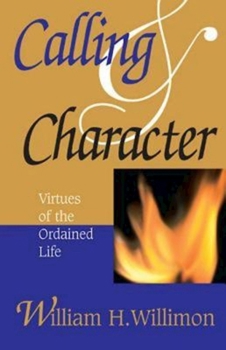Calling and Character: Virtues of the Ordained Life
Select Format
Select Condition 
Book Overview
In Calling & Character, Willimon lays out a clear and compelling picture of the pastoral life, one that will inform both those embarking on ordained ministry and those who have been in it for many... This description may be from another edition of this product.
Format:Paperback
Language:English
ISBN:0687090334
ISBN13:9780687090334
Release Date:October 2000
Publisher:Abingdon Press
Length:112 Pages
Weight:0.61 lbs.
Dimensions:0.6" x 5.5" x 8.5"
Customer Reviews
3 ratings
highly recommended
Published by Thriftbooks.com User , 15 years ago
As usual, Pastor Willimon stops you in your tracks with a number of passages in his thought progression. He causes you to think, to ruminate, to apply, to dream, and to pray. All of that lends direction to a direction-less world and, often, direction-less ministry. I can't recommend this book more highly than that; it also strikes me that what I just described is what Jesus did with His disciples. Even if you think you "know" early Christian history, he also includes a number of great insights *ABOUT* Christian history (especially regarding Chrysostom) of which you may not be aware, insights which may really "stretch you" a good deal.
Clear and Concise view of the Ethical Life
Published by Thriftbooks.com User , 22 years ago
This is a book about clergy ethics, but Willimon does not take the normal path of ethical discussion, trying to determine right and wrong actions, setting up situations and discussing the ethical choices involved. Instead, for Willimon, ethics in general and clergy ethics in particular are all about one's relationship with the Lord. Rather than asking "what should I do?" in a given situation, Willimon argues that we need to ask "Who am I to be?" This doesn't seem like an earth-shatteringly original thesis, but in the legalistic world in which we live, it's refreshing to see someone focussing on the Big Picture rather than on the quotidian minutiae of finely split hairs.For Willimon, an ethical life comes from habits of biblical study, submission to the will of God and the church, living in community with one's flock and one's colleagues, bearing the crosses of ministry faithfully and patiently, and developing a humble sense of humor in one's ministry. This last one is interesting, because he isn't calling on ministers to be entertaining (though that might come through the use of humor); instead he encourages ministers to develop a sense of irony and satire that serves the counter-cultural calling of the church. In other words, we should develop a sense of humor like Jesus'. After all, if the Church cannot highlight the foibles and follies of modern life, then what institution can?
Breath of Fresh Air for Pastors
Published by Thriftbooks.com User , 23 years ago
In an age intoxicated by techniques, quick formulas, and market surveys, it is refreshing to receive advice on pastoral ministry that not only doesn't appeal to these things, but rejects them as insignificant to true Christian ministry. According to William H. Willimon, the first question a minister must ask himself is not, "What ought I do?" but rather, "Who am I to be?" These two questions are connected, but must be considered in the appropriate order. A minister's identity is vitally linked to his sense of God's calling on his life. "What pastors do is a function of who pastors are... Our danger is that we might 'black out,' that is lose consciousness of why we are here and who we are called to be for Christ and his church" (p.21). Only a strong sense of purpose arising from God's call can sustain a pastor in the hard work of gospel ministry. Willimon quotes Robert Wilson on this point, "You can't pay people to do the things that ministers routinely must do... They need to think God has called them, or ministry is miserable" (p. 22). Neither the approval nor the needs of his parishioners must control the pastor's ministry, lest he lose sense of his true calling and purpose in the life of the church. "In a culture of omnivorous need, all-consuming narcissism, clergy who have no more compelling motive for their ministry than 'meeting people's needs' are dangerous to themselves and to a church that lacks a clear sense of who it is" (p. 24). With this as a foundation, Willimon highlights the ethical challenges peculiar to clergy and "the way in which clerical character informs these challenges" (p. 12). In his chapter concerning the character of the clergy, he argues that faithful ministers must have such a strong sense of God's calling that they are able to "love the truth of Christ even more than their congregation's affections" (p. 48). In his discussion concerning the pastor in community, Willimon argues that the Pauline "test for the ethical appropriateness of a given practice is, Does this edify the body?" (p. 61). American Christianity is far too individualistic. Willimon laments, "I am conditioned by my culture to ask, 'What does this mean for me?' rather than to ask the corporate, 'What is the Bible saying to us?'" (p. 76). In his chapter on crossbearing, Willimon argues that no true gospel ministry will be without troubles. If Jesus' ministry was wrought with troubles, rejection, and betrayal, contemporary ministers should expect no better. Like Paul, faithful ministry will demand that pastors are "willing to provoke division, call names, condemn, accuse, and judge" (p. 96) for the sake of the cruciform gospel they proclaim. Put simply, the "[c]ross produces conflict" (p. 111). Willimon warns that parishioners will not prefer this kind of ministry but will prefer a comfortable social club setting instead. Out of all the minister's responsibilities, the one last aspect of ministry that parishioners still approve of is personal counseling.






